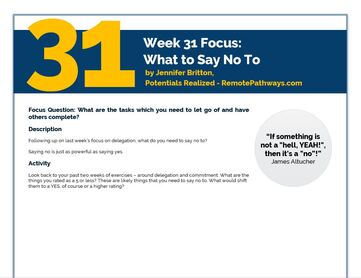 Focus Question: What are the tasks which you need to let go of and have others complete? Description Following up on last week’s focus on delegation, what do you need to say no to? Saying no is just as powerful as saying yes. Activity Look back to your past two weeks of exercises – around delegation and commitment. What are the things you rated as a 5 or less? These are likely things that you need to say no to. What would shift them to a YES, of course or a higher rating? Best, Jennifer Jennifer Britton
Co-host of the Remote Pathways Podcast Potentials Realized – Coaching, Training and Consulting Services for remote teams, leaders and professionals Check out the most recent Remote Pathways Podcast Episode, where we explore the people, places and processes of exceptional remote work. You can listen to the latest episode here, or on your favorite podcast player.
0 Comments
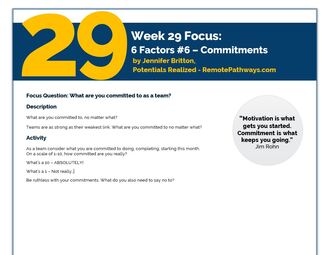 Focus Question: What are you committed to as a team? Description What are you committed to, no matter what? Teams are as strong as their weakest link. What are you committed to no matter what? Activity As a team consider what you are committed to doing, completing, starting this month. On a scale of 1-10, how committed are you really? What’s a 10 – ABSOLUTELY! What’s a 1 – Not really… Be ruthless with your commitments. What do you also need to say no to? All the best! Jennifer Jennifer Britton
Co-host of the Remote Pathways Podcast Potentials Realized – Coaching, Training and Consulting Services for remote teams, leaders and professionals Check out the most recent Remote Pathways Podcast Episode, where we explore the people, places and processes of exceptional remote work. You can listen to the latest episode here, or on your favorite podcast player. 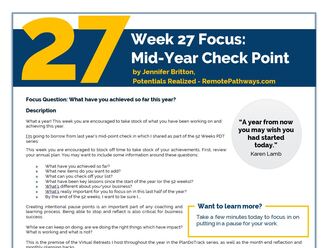 Focus Question: What have you achieved so far this year? Description What a year! This week you are encouraged to take stock of what you have been working on and achieving this year. I’m going to borrow from last year’s mid-point check in which I shared as part of the 52 Weeks PDT series: This week you are encouraged to block off time to take stock of your achievements. First, review your annual plan. You may want to include some information around these questions:
Creating intentional pause points is an important part of any coaching and learning process. Being able to stop and reflect is also critical for business success. While we can keep on doing, are we doing the right things which have impact? What is working and what is not? This is the premise of the Virtual Retreats I host throughout the year in the PlanDoTrack series, as well as the month end reflection and monthly planning hacks.  Activity Use this as a time to focus in on what you have achieved in the first half of the year. Questions you might want to reflect on are: 1. What's important about achieving or completing this goal? (Coaching Note: As we know as coaches, it can be useful to reconnect with the 30,000-foot view and WHY the issues are important. As you step back - or step up - to look at this, what new energy and ideas are generated?) 2. What is the quickest way to achieve it? What's another way? And another way? (Coaching note: as we often see, generating alternative solutions can be invaluable and spur us on to more complete solutions.) 3. What shiny, red objects have shown up? Which are causing a distraction? 4. What's most important to you in your business right now? 5. Who can provide the support and resources you need to be successful? 6. What do you need to say NO to in order to focus on your goal? 7. When did you last pause to take stock (and TRACK) where things were at? 8. What's going to create some momentum for you? 9. What are you doing to note, and celebrate, milestones (and learning) along the way? Best, Jennifer These were questions I included in September 2018: https://www.coachingbusinessbuilder.com/blog/less-than-100-days-to-go-in-2018-what-do-you-want-to-focus-on Jennifer Britton
Co-host of the Remote Pathways Podcast Potentials Realized – Coaching, Training and Consulting Services for remote teams, leaders and professionals Check out the most recent Remote Pathways Podcast Episode, where we explore the people, places and processes of exceptional remote work. You can listen to the latest episode here, or on your favorite podcast player. 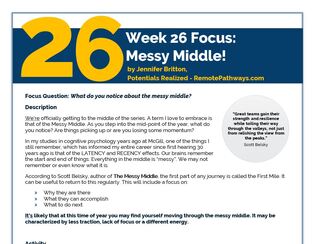 Focus Question: What do you notice about the messy middle? Description We’re officially getting to the middle of the series. A term I love to embrace is that of the Messy Middle. As you step into the mid-point of the year, what do you notice? Are things picking up or are you losing some momentum? In my studies in cognitive psychology years ago at McGill, one of the things I still remember, which has informed my entire career since first hearing 30 years ago is that of the LATENCY and RECENCY effects. Our brains remember the start and end of things. Everything in the middle is “messy”. We may not remember or even know what it is. According to Scott Belsky, author of The Messy Middle, the first part of any journey is called the First Mile. It can be useful to return to this regularly. This will include a focus on:
It’s likely that at this time of year you may find yourself moving through the messy middle. It may be characterized by less traction, lack of focus or a different energy.  Activity What do you notice about the energy and focus of the mid-point of this year? Consider what’s going to help you get traction from the Messy Middle? What’s important to you at this phase? For more on this topic check out: The Monthly Daily Trackers are a great visual tool to view what’s happening in your work and business. What do you notice about the data and trends? There are twelve sets of Monthly Daily Trackers and twelve sets of Monthly Content Trackers in the planner section. Best, Jennifer Jennifer Britton
Co-host of the Remote Pathways Podcast Potentials Realized – Coaching, Training and Consulting Services for remote teams, leaders and professionals Check out the most recent Remote Pathways Podcast Episode, where we explore the people, places and processes of exceptional remote work. You can listen to the latest episode here, or on your favorite podcast player. 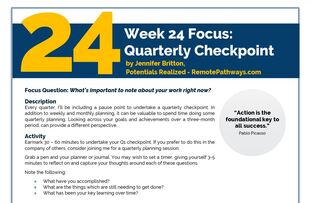 Focus Question: What’s important to note about your work right now? Description Every quarter, I’ll be including a pause point to undertake a quarterly checkpoint. In addition to weekly and monthly planning, it can be valuable to spend time doing some quarterly planning. Looking across your goals and achievements over a three-month period, can provide a different perspective. 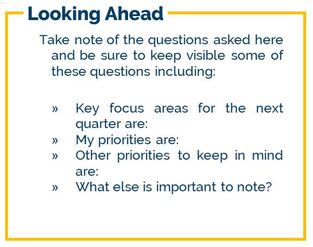 Activity Earmark 30 – 60 minutes to undertake your Q1 checkpoint. If you prefer to do this in the company of others, consider joining me for a quarterly planning session. Grab a pen and your planner or journal. You may wish to set a timer, giving yourself 3-5 minutes to reflect on and capture your thoughts around each of these questions. Note the following:
Over the last three months ask yourself:
Note your programming and/or services deliver. Ask yourself:
For more on this topic check out: PlanDoTrack – Quarterly Planning Section Remote Pathways New Guide – Quarterly Checkpoint (Day 30) Best, Jennifer Jennifer Britton
Co-host of the Remote Pathways Podcast Potentials Realized – Coaching, Training and Consulting Services for remote teams, leaders and professionals Check out the most recent Remote Pathways Podcast Episode, where we explore the people, places and processes of exceptional remote work. You can listen to the latest episode here, or on your favorite podcast player. 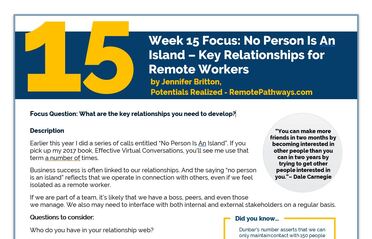 Focus Question: What are the key relationships you need to develop? Description Earlier this year I did a series of calls entitled “No Person Is An Island”. If you pick up my 2017 book, Effective Virtual Conversations, you’ll see me use that term a number of times. Business success is often linked to our relationships. And the saying “no person is an island” reflects that we operate in connection with others, even if we feel isolated as a remote worker. If we are part of a team, it’s likely that we have a boss, peers, and even those we manage. We also may need to interface with both internal and external stakeholders on a regular basis. 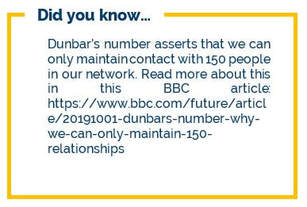 Questions to consider:
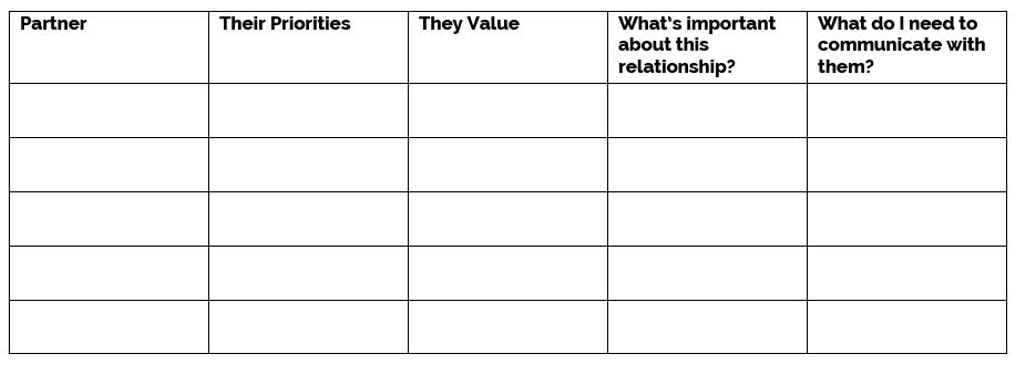 Activity For each key relationship, work through the questions listed here. For more on this topic check out: Check out the Top 20 Activities in PlanDoTrack, as well as the Relationship Mapping Exercise. Enjoy! Jennifer Jennifer Britton
Co-host of the Remote Pathways Podcast Potentials Realized – Coaching, Training and Consulting Services for remote teams, leaders and professionals Check out the most recent Remote Pathways Podcast Episode, where we explore the people, places and processes of exceptional remote work. You can listen to the latest episode here, or on your favorite podcast player. 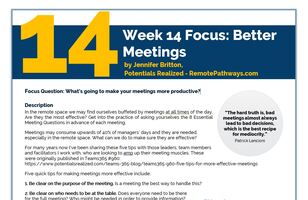 Focus Question: What’s going to make your meetings more productive? Description In the remote space we may find ourselves buffeted by meetings at all times of the day. Are they the most effective? Get into the practice of asking yourselves the 8 Essential Meeting Questions in advance of each meeting. Meetings may consume upwards of 40% of managers’ days and they are needed, especially in the remote space. What can we do to make sure they are effective? For many years now I’ve been sharing these five tips with those leaders, team members and facilitators I work with, who are looking to amp up their meeting muscles. These were originally published in Teams365 #960. Read it here. 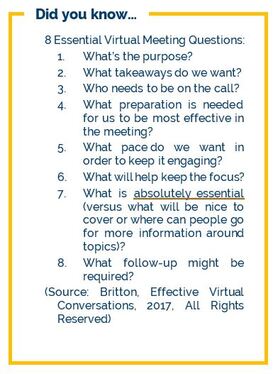 Five quick tips for making meetings more effective include: 1. Be clear on the purpose of the meeting. Is a meeting the best way to handle this? 2. Be clear on who needs to be at the table. Does everyone need to be there for the full meeting? Who might be needed in order to provide information? Decisions? Authority? Make sure you know who will need to be there or else it may mean another meeting. Having everyone there all the time may actually slow the meeting down. At this point, you will want to start considering who needs to be there, when. 3. What is the outcome you desire? What are the 3-5 tangible takeaways you want from the meeting? This question will help to reinforce what the purpose is, and who really should be at the table. 4. What decisions have been made? What outcomes are expected, and what are the timelines? Who is responsible for doing this? Tracking it? Reporting on it? What will follow up look like? Being granular in this stage is key to success. Many times, it is glossed over. Be sure to leave sufficient time to summarize key decisions made, and implications of this. 5. Keep to time. Time management is an art form with effective meetings. Being too lax with time can lead to frustration and disengagement. If timing tends to fall off, assign someone a timekeeper role, and put your stronger facilitator in the chair seat to keep the meeting moving. Tangents don't always benefit meetings. The cost of NOT undertaking meetings is high. What’s the right balance for your team in terms of sharing information and also making them most efficient? For more on this topic check out: Effective Virtual Conversations Chapter 9 – In Focus: Virtual Meetings of All Stripes Best wishes, Jennifer Jennifer Britton
Co-host of the Remote Pathways Podcast Potentials Realized – Coaching, Training and Consulting Services for remote teams, leaders and professionals Check out the most recent Remote Pathways Podcast Episode, where we explore the people, places and processes of exceptional remote work. You can listen to the latest episode here, or on your favorite podcast player. 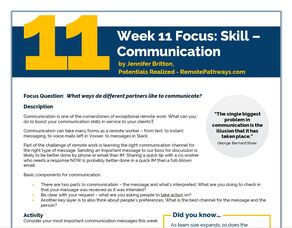 Focus Question: What ways do different partners like to communicate? Description Communication is one of the cornerstones of exceptional remote work. What can you do to boost your communication skills in service to your clients? Communication can take many forms as a remote worker – from text, to instant messaging, to voice mails left in Voxxer, to messages in Slack. Part of the challenge of remote work is learning the right communication channel for the right type of message. Sending an important message to our boss for discussion is likely to be better done by phone or email than IM. Sharing a quick tip with a co-worker who needs a response NOW is probably better done in a quick IM than a full-blown email. Basic components for communication:
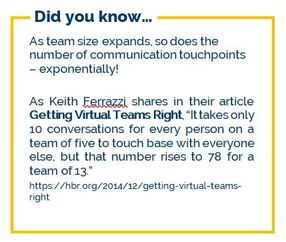 Activity Consider your most important communication messages this week. Ask yourself:
For more on this topic check out: Communication in general is the main focus of my 2017 book, Effective Virtual Conversations. Be sure to read the relevant chapters – for example, chapters 9 – 11 if you are a virtual or remote team, or Best, Jennifer Jennifer Britton
Co-host of the Remote Pathways Podcast Potentials Realized – Coaching, Training and Consulting Services for remote teams, leaders and professionals Check out the most recent Remote Pathways Podcast Episode, where we explore the people, places and processes of exceptional remote work. You can listen to the latest episode here, or on your favorite podcast player. 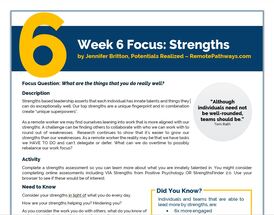 Focus Question: What are the things that you do really well? Description Strengths based leadership asserts that each individual has innate talents and things they can do exceptionally well. Our top strengths are a unique fingerprint and in combination create “unique superpowers”. As a remote worker we may find ourselves leaning into work that is more aligned with our strengths. A challenge can be finding others to collaborate with who we can work with to round out of weaknesses. Research continues to show that it’s easier to grow our strengths than our weaknesses. As a remote worker the reality may be that we have tasks we HAVE TO DO and can’t delegate or defer. What can we do overtime to possibly rebalance our work focus? 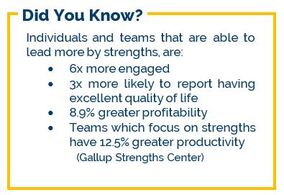 Activity Complete a strengths assessment so you can learn more about what you are innately talented in. You might consider completing online assessments including VIA Strengths from Positive Psychology OR StrengthsFinder 2.0. Use your browser to see if these would be of interest. Need to Know Consider your strengths in light of what you do every day. How are your strengths helping you? Hindering you? As you consider the work you do with others, what do you know of notice about their strengths and preferences? What might you need to magnify or minimize in order to relate with them better? So what? – What’s important about this topic? Understanding our strengths and how we might overleverage them is an important part of remote worker’s self-awareness. When things are busy, uncertain or stressful, it’s likely that we may lean into our strengths. Sometimes strengths become over leveraged and create a blindspot. Consider where you might be overleveraging or over utilizing your strengths. For more on this: Check out section 1 and section 4 of PlanDoTrack and Coaching Business Builder. Section 4 asks you to consider the strengths that you bring, also in combination with your values and opportunities. This is a rich body of work you will want to explore as a leader of a team. Be sure to check out some of these books: Go, Put Your Strengths to Work – Marcus Buckingham Strengths-Based Leadership StrengthsFinder2.0 All the best, Jennifer Check out the most recent Remote Pathways Podcast Episode which covers the topic of Vision. You can listen to Episode 4 here, or on your favorite podcast player.
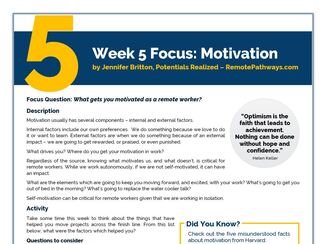 Focus Question: What gets you motivated as a remote worker? Description Motivation usually has several components – internal and external factors. Internal factors include our own preferences. We do something because we love to do it or want to learn. External factors are when we do something because of an external impact – we are going to get rewarded, or praised, or even punished. What drives you? Where do you get your motivation in work? Regardless of the source, knowing what motivates us, and what doesn’t, is critical for remote workers. While we work autonomously, if we are not self-motivated, it can have an impact. What are the elements which are going to keep you moving forward, and excited, with your work? What’s going to get you out of bed in the morning? What’s going to replace the water cooler talk? Self-motivation can be critical for remote workers given that we are working in isolation. 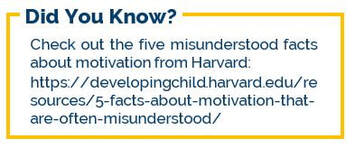 Activity Take some time this week to think about the things that have helped you move projects across the finish line. From this list below, what were the factors which helped you? Questions to consider:
For more on this: Check out the Iceberg exercise in section 1 of PlanDoTrack and Coaching Business Builder. Be clear on what your motivators are. Inquire about others on your team. Some additional resources around motivation include writing from authors including: Maslow, Daniel Pink - Drive Best wishes, Jennifer Check out the most recent Remote Pathways Podcast Episode which covers the topic of Vision. You can listen to Episode 4 here, or on your favorite podcast player.
|
AuthorThe Remote Pathways blog follows many of the themes we explore in the Remote Pathways Podcast. This year (2020) we're proud to bring you a 52 week-series for you to follow along throughout the year. Posts are penned by co-host Jennifer Britton, an avid award-winning blogger for many years. Jennifer is the author of five books. Visit her author page on Amazon. Archives
December 2020
Categories
All
|


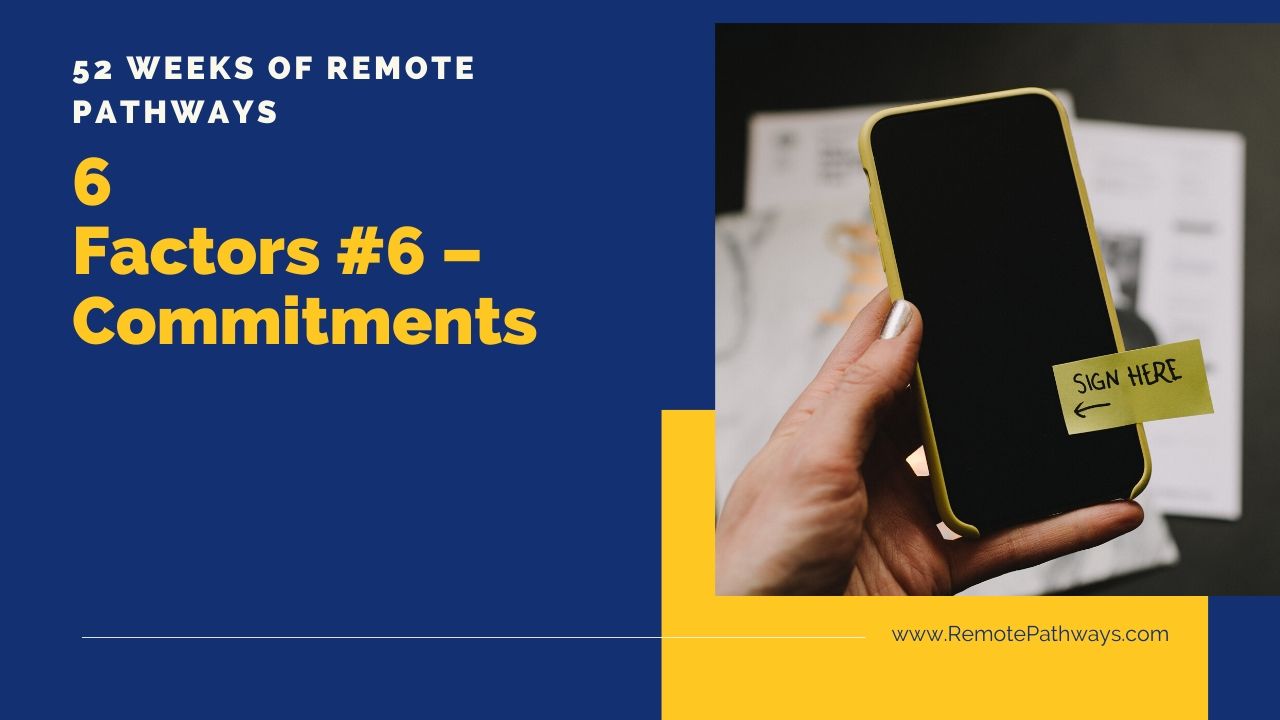
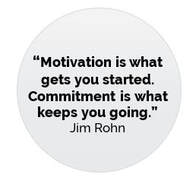
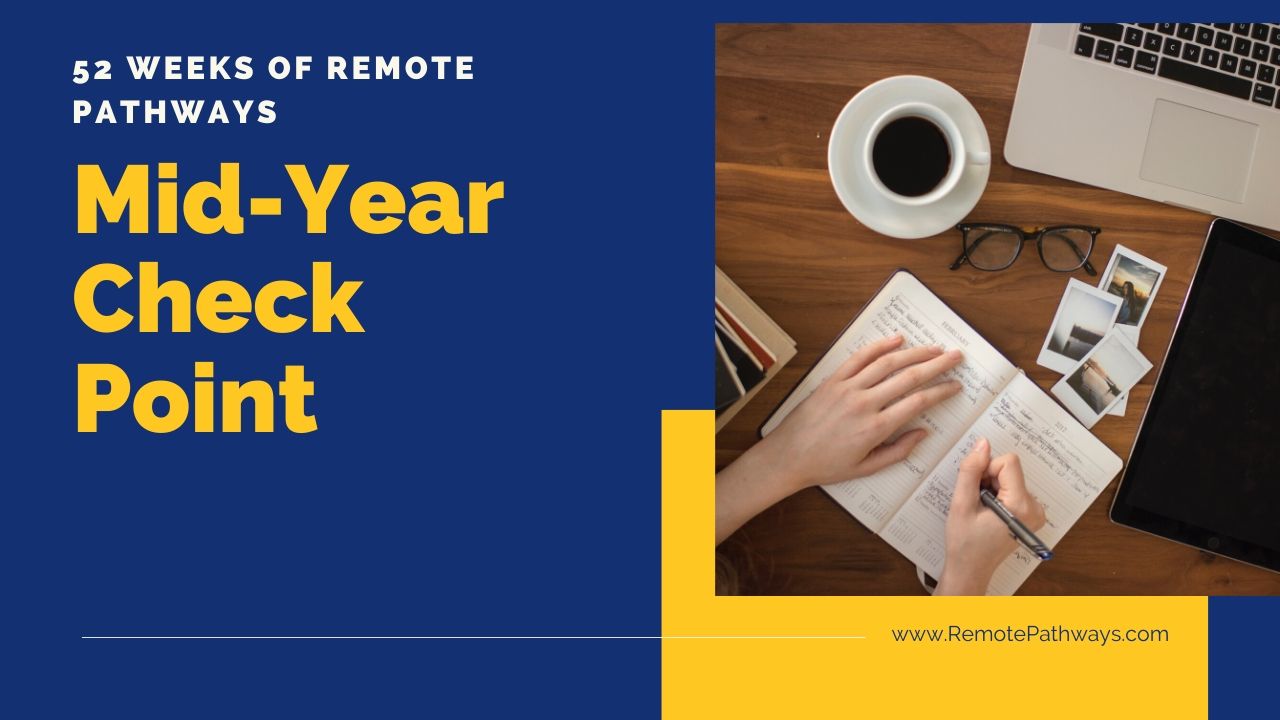
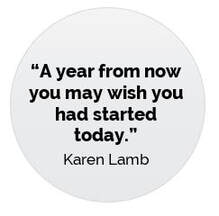
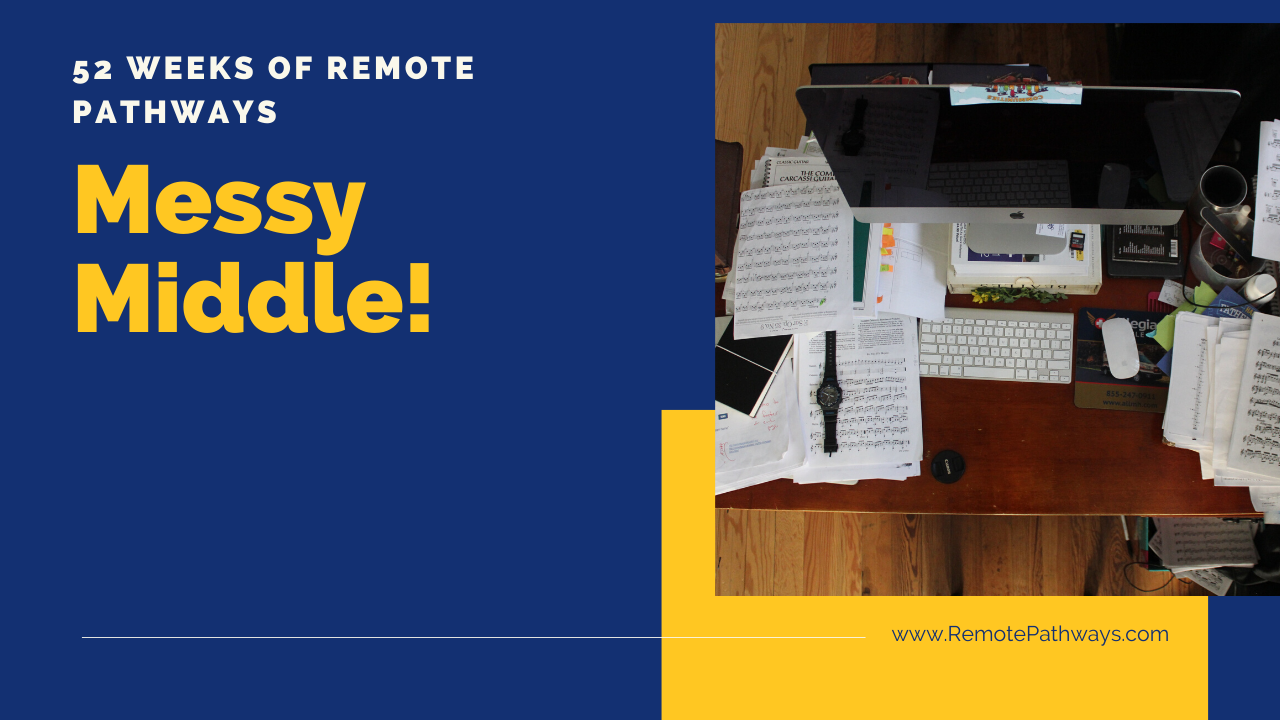
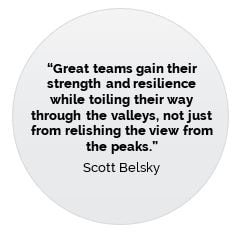
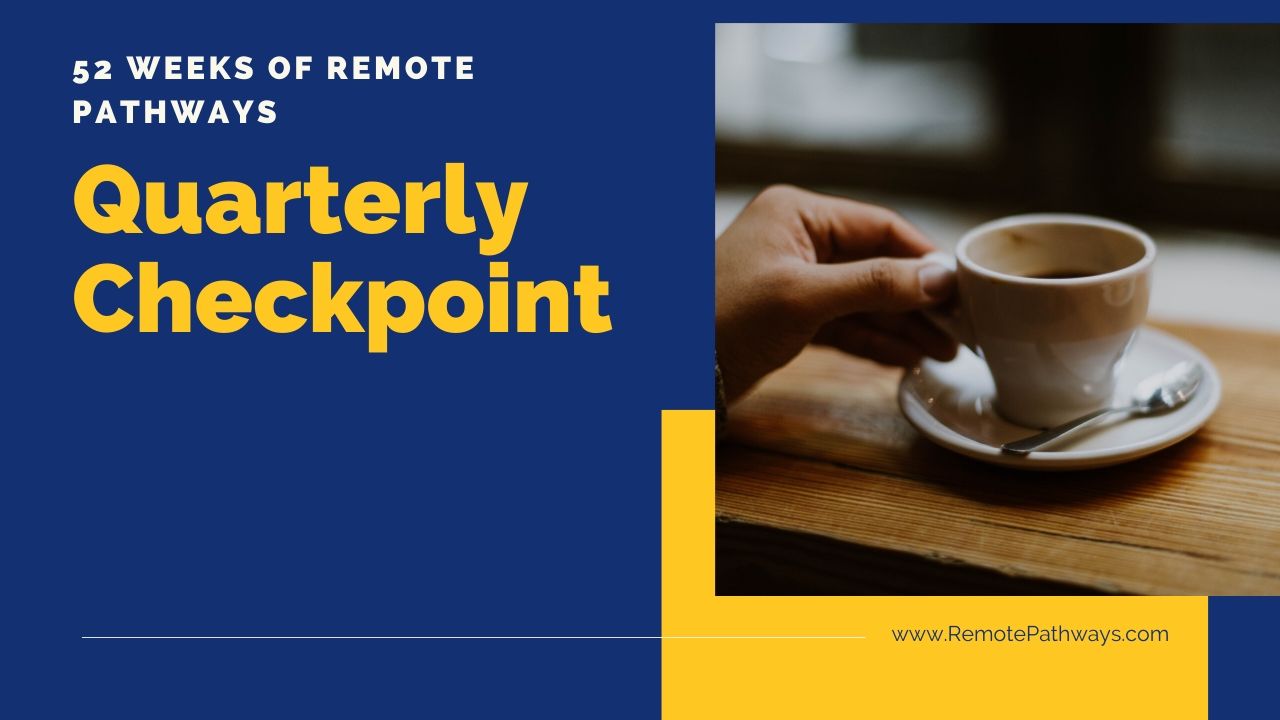
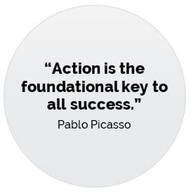
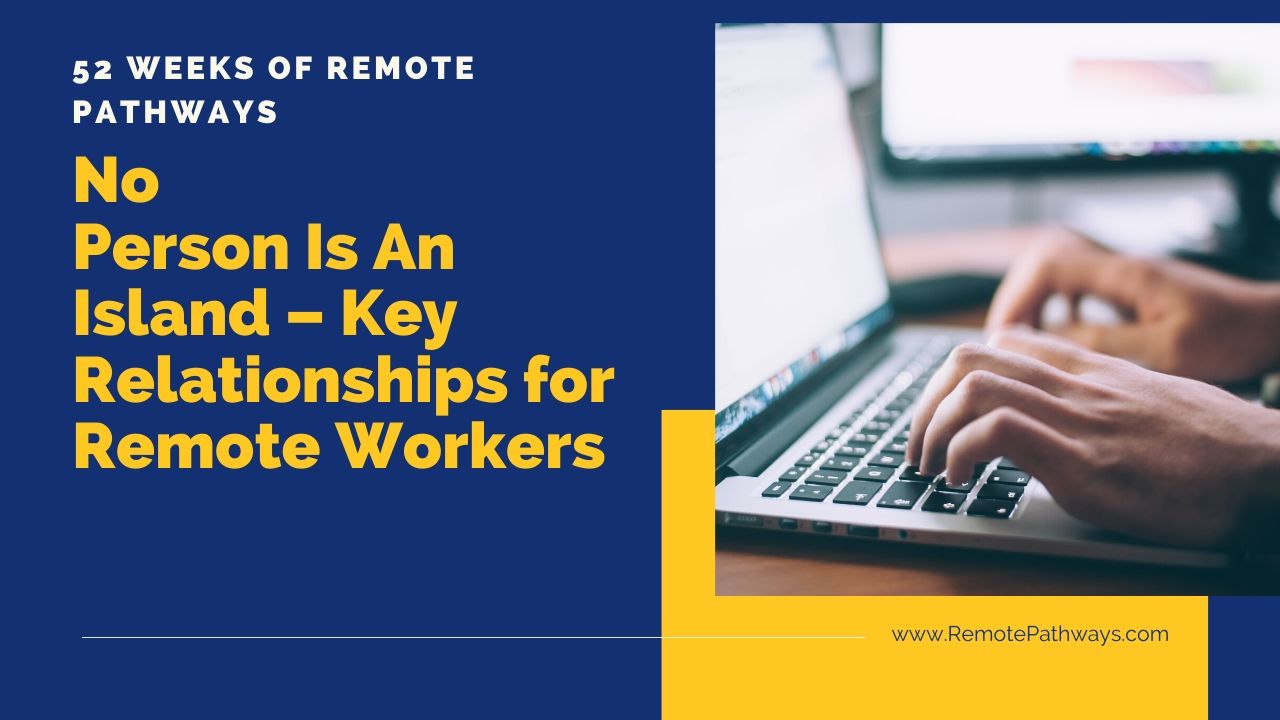
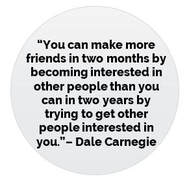
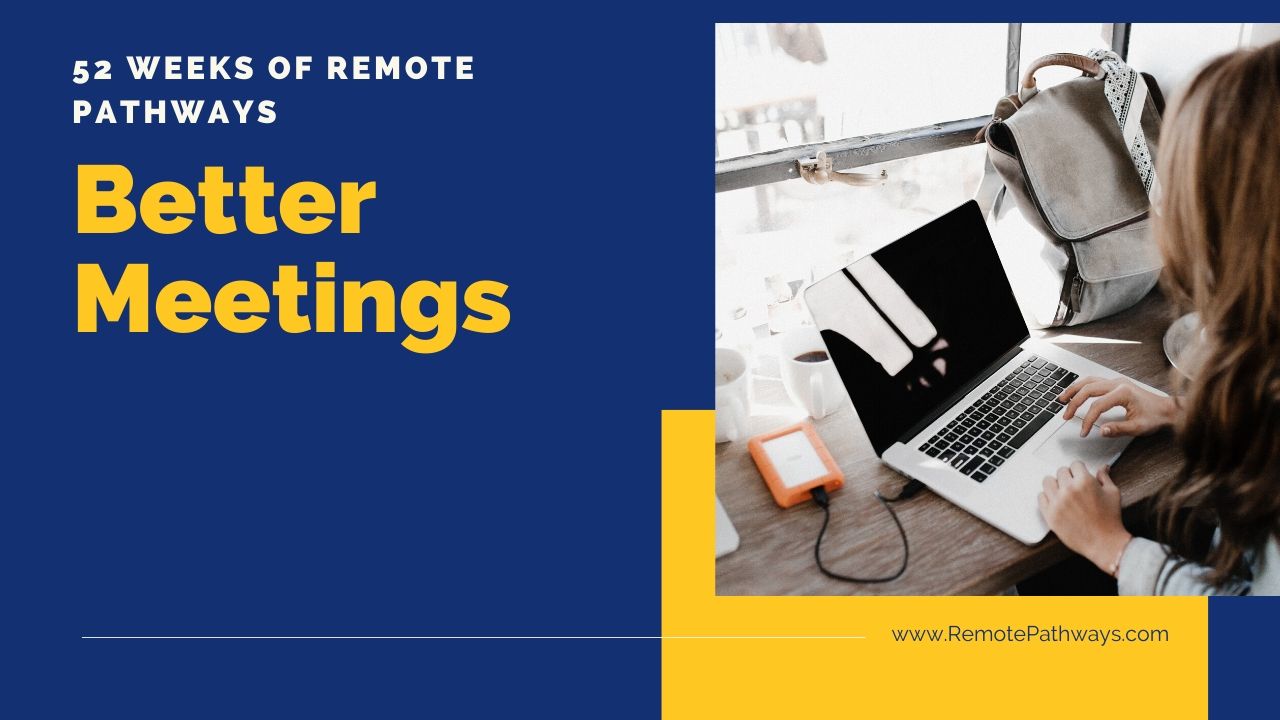
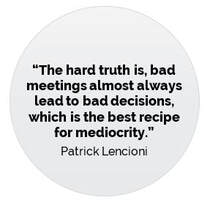
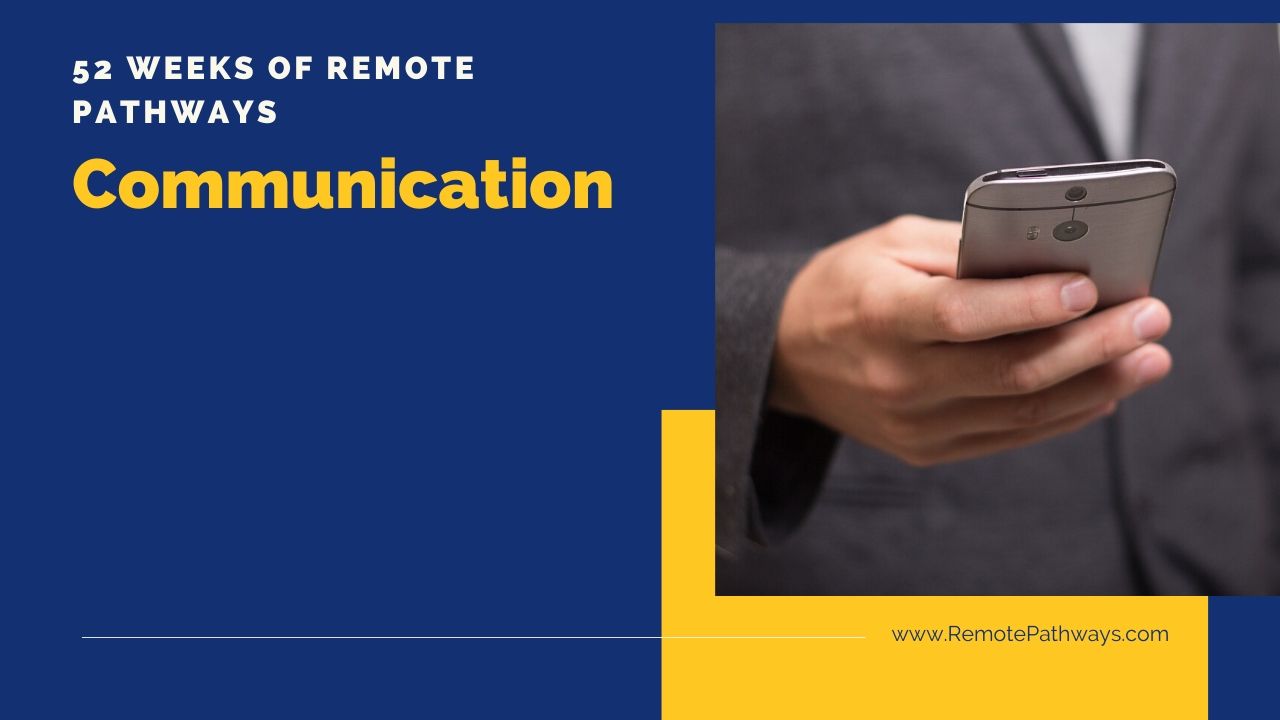
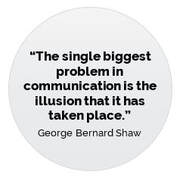
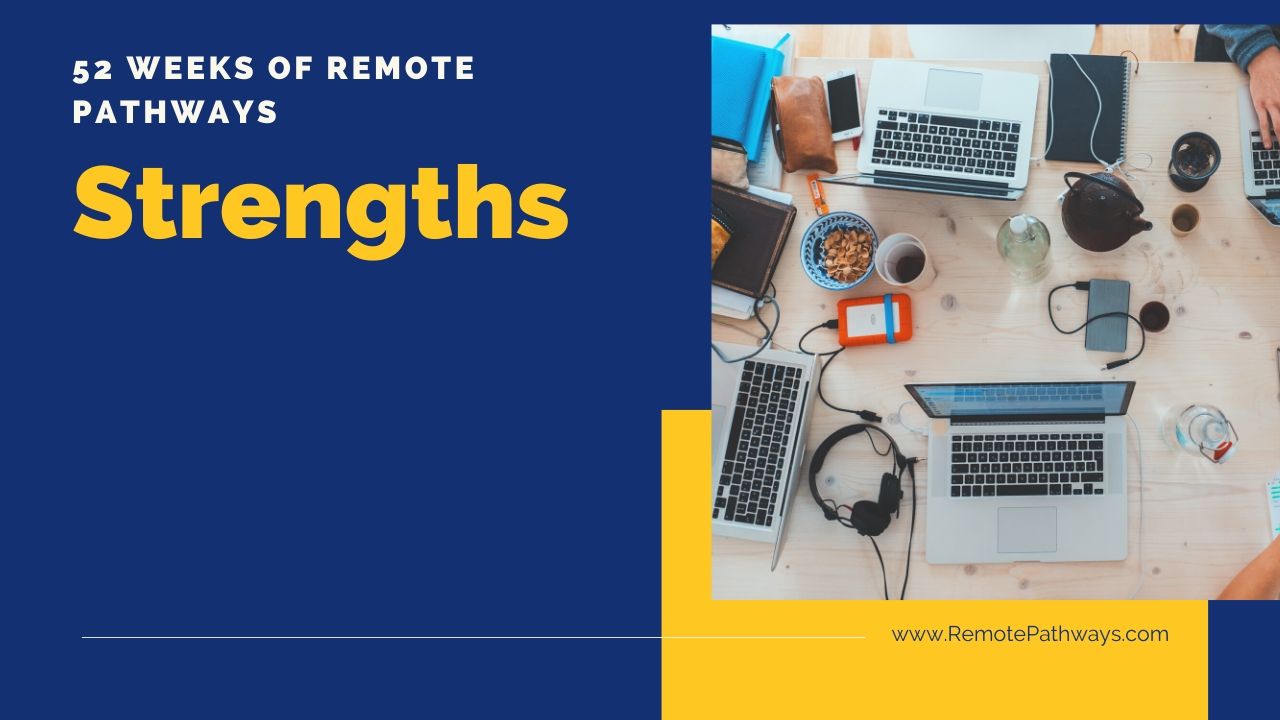
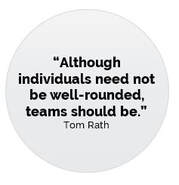
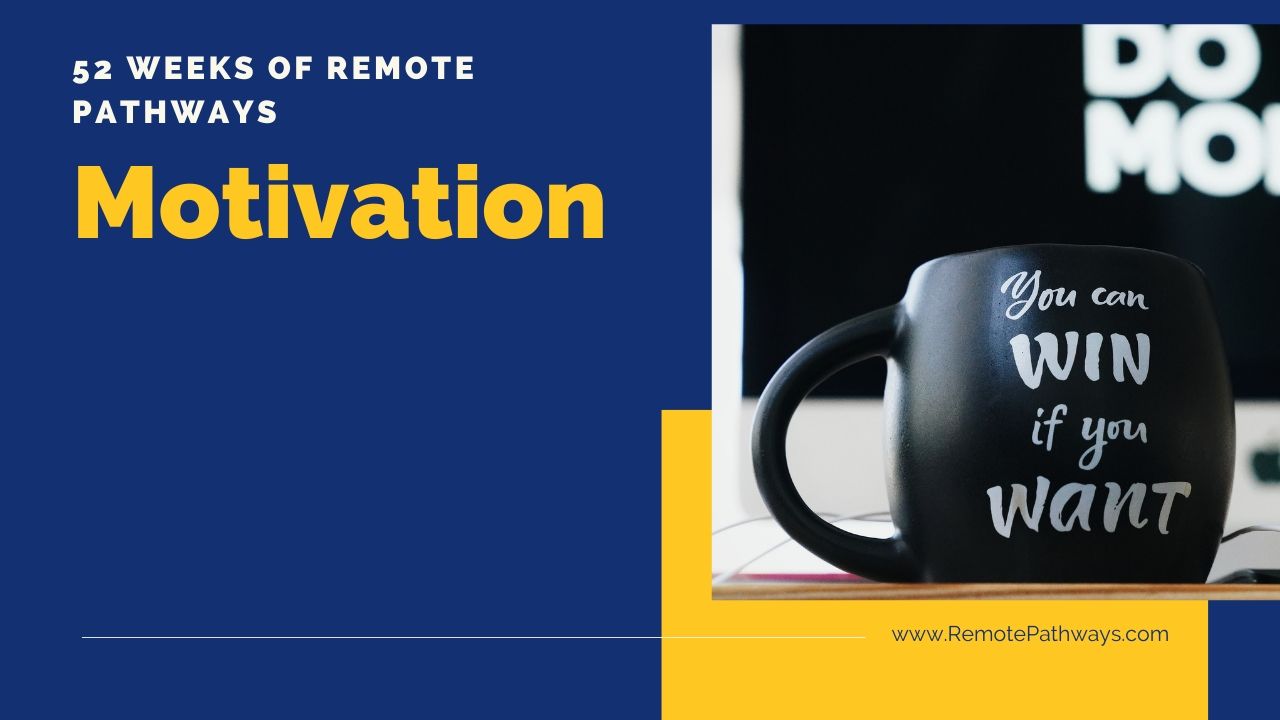
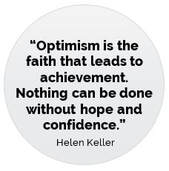
 RSS Feed
RSS Feed